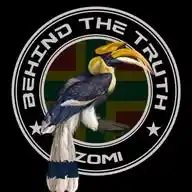
𝔹𝔼ℍ𝕀ℕ𝔻 𝕋ℍ𝔼 𝕋ℝ𝕌𝕋ℍ (𝔹𝕋𝕋)
January 27, 2025 at 03:18 AM
*Week 2: The Zomi Way of Life*
*Day 8: Tlawmngaihna: The Zomi Ethos*
What does prioritizing the collective over the individual mean in a world that often equates success with self-interest? This question has always had a clear answer for the Zomi: _Tlawmngaihna._ Deeply rooted in their culture and history, _Tlawmngaihna_ is more than a moral code—it is a way of life, a philosophy that has guided the Zomi for centuries. Loosely translated, _Tlawmngaihna_ encompasses selflessness, endurance, and a commitment to communal well-being. Yet, for the Zomi, it is far richer in meaning than words can capture.
_Tlawmngaihna_ is an integral part of Zomi culture. It is not merely an aspiration but a lived reality, shaping how the Zomi approach relationships, leadership, and even survival. It calls upon individuals to put the community's needs ahead of their own, whether by caring for the elderly, stepping forward in moments of crisis, or helping neighbours during the planting and harvesting seasons. This ethos ensured no one was left behind and every community member contributed to its collective strength. While interviewing him for this project, one Zomi scholar notes, "_Tlawmngaihna_ is not merely a principle to admire; it is a lived philosophy guiding every aspect of communal life."
This moral principle shaped not only daily interactions but also leadership. Chiefs and village elders, the custodians of Zomi traditions, were expected to embody _Tlawmngaihna_ in their governance. Leadership was not about power or prestige but service to the people. Women, too, played critical roles in upholding this ethos as caregivers, cultural custodians, and contributors to the family's survival. Even young men and women were raised with a strong sense of duty and encouraged to put community first in everything they did.
But _Tlawmngaihna_ is not just a relic of a simpler, rural past—it remains profoundly relevant today. In the modern world, where globalization and individualism often challenge traditional values, _Tlawmngaihna_ stands as a powerful reminder of the importance of community. It offers a counter-narrative to contemporary life's hyper-competitive, self-centred ethos, encouraging us to think beyond personal success and measure our worth by the strength of the relationships and communities we build.
This philosophy has not been without its challenges. As younger generations embrace urbanization, technology, and global mobility, they find themselves caught between the demands of modern life and the values of their ancestuors. Yet _Tlawmngaihna_ is remarkably resilient. As one Zomi elder remarked, "It is in times of great change that _Tlawmngaihna_ matters most—when it binds us to who we are". This sentiment speaks to the enduring relevance of this principle as both a guide and a reminder of what it means to belong.
In many ways, _Tlawmngaihna_ transcends its cultural origins. It invites reflection among the Zomi and anyone grappling with questions of community and identity. How do we balance individual ambition with the needs of the collective? What does it mean to prioritize others without losing sight of ourselves? These questions resonate far beyond the highlands of Northeast India, offering universal lessons on resilience, empathy, and the power of shared purpose.
*Reflection:*
In a world that often rewards self-interest, how can we revive the spirit of _Tlawmngaihna_ in our daily lives? What would it look like to truly put others first while staying rooted in our values and purpose?
*Quote to Highlight:*
"_Tlawmngaihna_ is not simply a moral code; it is the soul of a community, a quiet yet unshakable strength that holds people together."
BTT
🔴🟡🟢
https://whatsapp.com/channel/0029VaYCqe71yT229xZ6f42y
❤️
👍
😂
🐒
💯
🖕
🤣
🦟
38